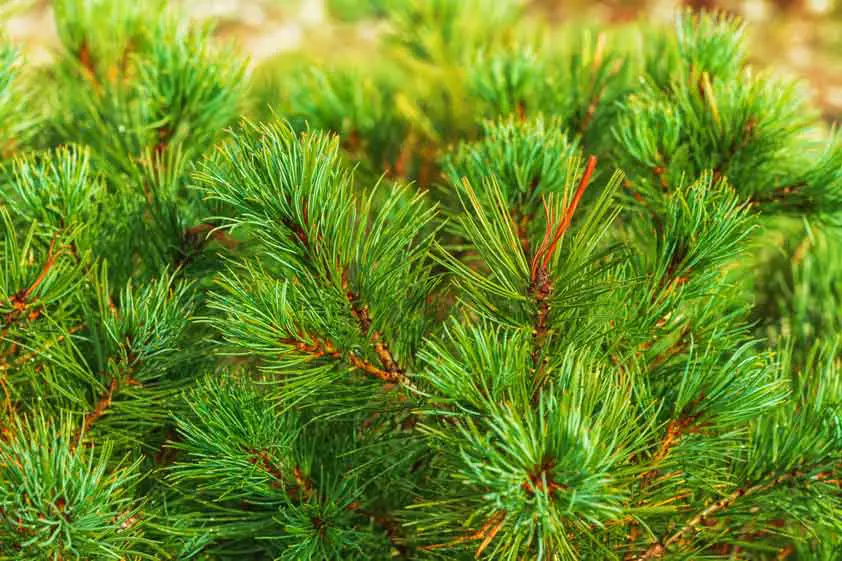Somehow pine trees have an aesthetic feel.
I always had a soft corner for a pine tree for a freshly-cut Christmas tree or a C-packed cup.
No wonder these woodsy plants grace a good chunk of my backyard. And Slevin, my pony, started Chewing those sharp needles a lot lately.
But the problem is -she seems to be suffering badly after chewing the needles.
Yes, every time she took these plants.
I was wondering if horses can eat pine needles. The next day, I took her to a vet; this article is all about what the doc says about this matter.
Related: Do you want to know if horses can eat okra? This comprehensive guide will inform you what vegetables horses can eat.
But first……..What are pine needles?
Yeah, those are the slender needle-shaped leaves we see on the Christmas tree.
Basically, it’s the leaves of the pinus.
Attached to the branch, they are typically about 1/8 inch long and occur in small clusters on a tree’s trunk. Usually, Pinus grows in cold climates and have a fast-growing rate, so they produce many needles over a short period of time.
Originating about 150 million years ago, These trees were found in the mid-Mesozoic Era.
Yeah, older than you think.
North America is heaven for this species, and you can enjoy its beauty all over the continent. At the height of around 300 feet, the leaves of these trees are typically green and blade-like and have a narrow margin on either side. The tree’s branches are often long, and the cones that mature from the branches point down.
Even these trees have a spiritual meaning.
You heard that right.
It’s the symbol of immortality and eternal life. This is mainly because it’s one of the very few plants that keep their leaves throughout the winter.
Related: Learn the benefits and risks of feeding your horses to eat corn on the cob. Find out if it’s safe to feed your horse corn on the cob and how to do it properly.

Are pine needles really poisonous?
The answer is yes, some of the species can be!
The leaves of at least 20 familiar pine trees are toxic to humans. And not only needles but also the branch tips and bark contain substances that could cause potentially lethal reactions.
For humans, the venom can cause severe problems such as fever, vomiting, and chest pain.
Astonishing, isn’t it?
I was so surprised to hear this as I am also a Pine tea fan. And I am not alone; native Americans drink this tea and believe it has a healing property.
Some specific needles are poisonous because of the isocupressic acid, a diterpene acid.
Isocupressic acid is found in many plants and can be toxic if ingested. This can cause severe poisoning if it is ingested in high doses.
Related: Can Horses Eat Cattails? (Explained for Beginners)

What about livestock? Are pine trees OK for horses to eat?
Again the same answer.
The above 20 types of pine leaves are dangerous for all domestic animals, including horses, cattle, sheep, and goats. You may ask what happens when livestock chews needles.
Well, they may face a couple of lethal reactions like…..
- Premature births.
- Miscarriages.
- Develop neurological disease.
Especially livestock will face birth complications after eating pine leaves.
There are reports that claim cattle had the complication of unborn calves just after 14 days after chewing a small portion. A farmer also reported an incident of sheep giving birth to a dead baby after eating pine leaves.
What types of pine needles are poisonous? How do identify edibles for foraging?
Most trees are non-toxic.
Some (20 will be the exact figure) are poisonous or toxic. Here are some of the pinus species you must avoid-
- Monterey.
- Lodgepole.
- Norfolk. (Australian Pine)
- Ponderosa.
- Common juniper.
- Loblolly.
- Yew.
Now comes the edibility. Some of the edible barks are……
- White. (Considered to be the best-tasting)
- Black birch.
- Slippery elm.
- Red/black spruce.
- Yellow birch.
- Tamarack.
- Balsam fir.
Related: Learn all about horse teeth: why they keep growing, how to care for them, and what to look for when it comes to dental health.
The takeaway………
Yes, not all pines are toxic for humans and livestock, including horses.
But it’s better to keep your horse away from pine leaves when they are pregnant. The horse usually doesn’t like to chew these leaves unless they are bored or food is scarce. So make sure that your pet is getting enough feed to function properly. And if pregnant horses eat this (even a small amount), take her to a vet as quickly as possible.



